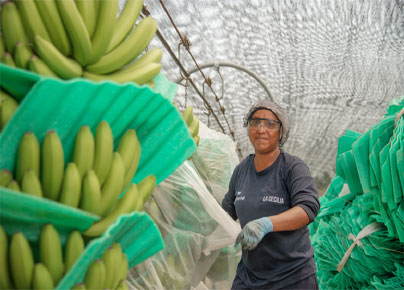Colombia: ASBAMA and ICA Strengthen Biosecurity Schemes for Bananas and Plantains
2024-08-30

Through a technical cooperation agreement between the national government and the banana sector, awareness workshops and training sessions were conducted, and 50 biosecurity kits were distributed. These kits consisted of four litres of quaternary ammonium, 500 grams of Biologicals—Trichoderma sp, a 50-kilo bag of Edaphic Fertilizer, and two 50-kilogram bags of composted organic matter.
A total of 50 small production units of plantain growers in La Guajira, 40 in Dibulla, and 10 in Riohacha will be able to strengthen their biosecurity schemes, reinforce phytosanitary monitoring actions, and understand the risks of contracting FocR4T on their properties. This is due to the fieldwork carried out by the Association of Banana Growers of Magdalena and La Guajira, ASBAMA, together with the Colombian Agricultural Institute ICA in La Guajira, which included: a training day, an awareness workshop, the application of a survey to understand phytosanitary protocols, and the delivery of 50 biosecurity kits. "Today we have the opportunity to continue the work that we have been doing for five years in partnership with the ICA, to support banana and plantain producers in the departments of Magdalena, César, and La Guajira (…) on this occasion we have adjusted the benefits plan that this agreement has, especially, aligning ourselves with new developments in research, in this case, what is being strengthened is the capacity of the soil," said Julio Alberto Reales, Administrative and Project Manager of ASBAMA. The cooperation agreement between the national government and the banana sector provided each small producer with a biosecurity kit that includes four litres of Quaternary Ammonium, 500 grams of Biologicals - Trichoderma sp, a 50-kilo bag of Edaphic Fertilizer, and two 50-kilogram bags of composted organic matter. These inputs will help improve the yield and resistance of the areas where they are cultivated. A workshop accompanied the delivery on the use and application of the biosecurity kit and warnings about the risk of contracting the disease if a suitable protocol is not maintained on the property and the crops. In total, 305 banana and plantain farms on the Colombian north coast will receive coverage of prevention, containment, and mitigation actions against the impacts of FocR4T in 2024. At least 230 will be properties of small producers and 75 of medium and large producers in Magdalena, Cesar, and La Guajira.
These intervention actions also included registering a sample of small producers from La Guajira, Cesar, and Magdalena to compare how they understand pests and diseases from their social conception of Musaceae and to raise awareness about compliance with phytosanitary protocols with the required regulations. This activity includes an awareness workshop, socioeconomic characterization, and the application of a knowledge survey on the risks and implications of Fusarium in crops. With this strategy, the aim is to detect shortcomings and weaknesses to work on them directly and reinforce the schemes, but above all, to install in the daily lives of plantain and banana growers in northern Colombia the biosecurity culture.
"Every day, it is understood that this is an integral action. It is not only about strengthening schemes if we are not aware of the value that this has in our productive unit; that's why we have a complementary axis in the agreement, where support is provided with sample analysis to detect the presence of the disease; a very emphatic scheme on risk communication, where we have a person who helps us to study socially the behavior of the producers.









